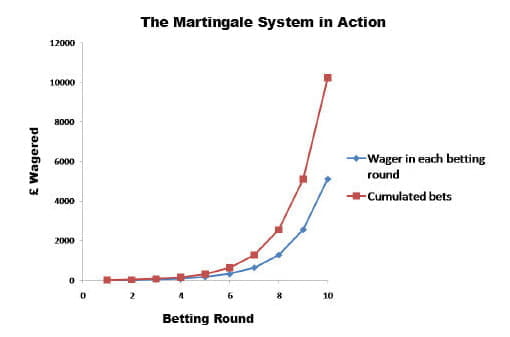Martingale strategy is one of the simplest and most popular betting systems that can be used on any casino game.

Below you can find instructions on how to use this strategy, how it works and much more. Also, it is very important that you understand that this strategy is not 100% accurate and that you are using it at your own risk.
Martingale strategy also stands for one of the simplest betting strategy systems in which you double your bet on every lost hand until you win, it can be applied to many real money games but is most popular in roulette online.
What is the Martingale all about?
Players would come to use the Martingale strategy that required someone to double their bet if they experienced a loss.
Then they would bet continuously until eventually, they win.
Upon a winning bet, the user is supposed to start over from their initial stake amount.
Because of this structure, the Martingale is classified as a progressive system, more specifically a negative progression system because the bet is doubled upon a loss.
How can you actually use the Martingale strategy?
Okay, so you know the origins of the popular Martingale system, but you’re not here for a history lesson.
Besides, no one bets on a coin toss anymore after it has been proven that it is not exactly 50/50.
Nevertheless, the same bet strategy can work on any game with even money odds, so there are no limitations.
To know how you can use this betting strategy, it’s better if you picture yourself in a casino and consider the games available.
Some of the available games that have even money odds include roulette, blackjack, baccarat, and craps online.
How does it work?
The basic premise behind the Martingale strategy is that in a 50/50 odds game like a coin toss, the result can never remain the same indefinitely.
In the example above with the coin toss, it is impossible for the coin to keep landing tails up indefinitely, and at some point, the coin will land heads up.
- Step1: The simplest way to understand how this betting system works is to consider a simple coin toss.
- Step2: Imagine you started betting heads on a coin toss and started at a $5 stake.
- Step3: The first flip lands on tails and the bet is lost, but now you are supposed to double the stake to $10 and have another go.
- Step4: If this bet is also lost, the third bet’s stake should be $20, and so on until the coin finally lands on heads and then you win.
Example
| BET | BET SIZE | WIN | PROFIT |
|---|---|---|---|
| 1 | NZ$ 1 | Lose | -NZ$ 1 |
| 2 | NZ$ 2 | Lose | -NZ$ 2 |
| 3 | NZ$ 4 | Lose | -NZ$ 4 |
| 4 | NZ$8 | Lose | -NZ$ 8 |
| 5 | NZ$ 16 | Win | NZ$ 16 |
The second part of the strategy that involves doubling the bet is meant to ensure that when the gambler eventually wins a bet, all their losses shall be recouped and provide a profit of one unit.
A single unit is basically the size of the initial stake.
What if you lose consecutively?
- Step1: Now consider the same coin toss bet described above, but you were unlucky enough to suffer 5 continuous losses.
- Step2: At this point, you would be down $155 and required to place a $160 stake on the next toss but the total exposure would be $315.
- Step3: If this sixth toss land heads up, you would win $320 and be left with a profit of $5, which was the initial stake amount.
- Step4: If you repeat the same process over and over, you are supposed to end up with a $5 profit each time and potentially make a lot of money.
Martingale strategy for roulette
Martingale strategy is mostly used on a roulette game, and if you want to learn more visit our roulette page and try it for free.
For example, you can play the roulette and bet on the red squares using the Martingale system.
Every time the ball lands on the black squares, you keep doubling the bet until eventually, you win the bet.
However, roulette tables also include a green square that may tip the odds slightly, but not so much that the strategy cannot work.
As for the other games, you’re pretty much good to go whenever you need a sure-fire system to beat the house.
If it works so well, why does the house keep winning?
A natural question to ask yourself right now is why more people don’t use the Martingale to make money. As usual, when the deal is too good, think twice, and you’re right to do so.
The only problem is that the Martingale needs the player to have unlimited money to ensure they always end up on top.
If you calculate using a geometric progression, you would find that by betting 5 NZ dollars at the blackjack table to start, you would need to bet over 5 million after 20 consecutive losses.
This is because the Martingale relies on the gambler’s fallacy that assumes something will happen just because it hasn’t happened for a while.
The truth is that it is not unlikely to experience 20 consecutive losses in a casino or even more, so you would need unlimited capital to keep playing.
Furthermore, most casinos in New Zealand will have a limit of, say, 8 consecutive losses, after which you will be barred. With these rules, the Martingale suddenly becomes impractical and therefore not as profitable.
History of the Martingale strategy
The origins of the betting strategy are unclear as you would expect from drunken men in casinos, but a lot of the credit is attributed to John Martindale.
He owned a casino in London around this time, and is said would often encourage any gambler who lost to double up their bet.
The actual name of the strategy would later be changed to Martingale, replacing “d” with “g’ as a contortion when the system was used beyond London.
He believed strongly in the casino’s house edge that he dared gamblers to double up, which would eventually become the main tenet of the Martingale strategy.
Gambling has always been a part of life dating back millennia, but the culture spread through Europe rapidly in the 18th century.
It was during this time that many gambling strategies were devised to gain an edge, including the Martingale strategy.
It was during this time that gambling meccas like Monte Carlo were also set up in a new age of gambling.
The first appearance of the Martingale strategy
‘The man who broke the bank at Monte Carlo’ was a popular song from the 1890s, mostly thanks to Charles Coborn.
The song draws inspiration from the tremendous accomplishments of one Charles Deville Wells who in 1891 won 1 million francs at a roulette table in Monte Carlo.
Adjusting for inflation, this would be the equivalent of winning over 10 million francs today!
We can never know how much money he started betting with, some say it was just 4,000 francs, but it must have been quite a haul to inspire a song to be written after you.
Breaking the bank refers to a situation where a player wins more chips than there are on the table. It rarely happens, but when it does, a black shroud is placed over the table until new chips are brought in.
Top casinos to play Roulette at:
-
Woo casino9.5NZ$ 300+ 200 free spins2000+ gamesCustomer support: 24/7Lightning-fast deposits and withdrawals18+ | Wager req: 40x | Gamblingtherapy.org | Play responsibly | Terms and Conditions Apply
-
Hello casino9.3NZ$ 100+ 10 no deposit spins (Exclusive bonus)2800+ gamesCustomer support: 24/7VIP program for everyone18+ | Bonus wager req is 35x deposit + bonus Terms and Conditions Apply
-
Casumo9.3NZ$ 1200+20 no deposit spins2000+ gamesCustomer support: 24/7Fast payout processing time18+ | Wager req: 30x | Gamblingtherapy.org | Play responsibly | Terms and Conditions Apply
FAQ
What is a Martingale strategy?
Martingale betting strategy is a betting system that with the help of mathematically calculated formulas gives you a chance to win the house in the long run.
There are many systems that can be divided into two groups, positive progression and negative.
Martingale belongs to a negative progression group that involves increasing stakes after each loss.
Is the Martingale strategy legal?
There is no law that prohibits this strategy, which makes it absolutely legal.
Remember this strategy does not guarantee you a 100% win rate.
On what types of games can Martingale strategy be used?
Martingale strategy is a betting pattern that can be used on most casino games including blackjack, roulette, sic bo, and others. Martingale strategy can be also used in sports betting.
3
-
2 -


